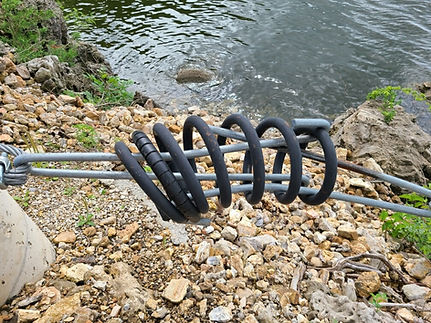Overkill Heavy Duty
Dock Springs
Overkill vs Progressive Dock Springs video. The Progressive Dock Springs are big... Overkills are huge.
Why "overkill"? Because overkill is underrated. These are the strongest dock anchor cable dampeners I make. I had a guy who has a monster dock on Lake of the Ozarks send me a picture of his failed dock cable dampener (see below). It had a broken compression link that looked to be made from 1/2" round bar and a junkyard coil spring. The spring still had the rubber isolation dampener from the automotive application.
This did a couple of things for me. It opened my eyes to a need for a more substantial dock cable dampener, showed me that inferior parts used are going to fail, and that there are monster docks out there that are more than twice the mass of what I have here on my home lake that need a better, bigger solution.
The Overkill Dock Springs weigh more than 20 pounds heavier each than the Progressive Dock Springs I make. I use one inch diameter steel round bar for the compression links instead of the 3/4" in the other springs. One inch is substantially bigger. See the picture above comparing 3/4" and 1". One inch bar takes 4 times longer to heat to forging temperatures where it can be formed into the compression link. One inch bar, once at forging temps, takes twice the effort to move. Its hard work. The spring used in constructing Overkill cable dampeners has over 2200 pound per inch constant compression rate with over 8 inches of compression available. Its strong.
If you have a large multi-slip monster party dock, these are for you. If you have had dock anchor cable dampeners fail and don't want to have to fix your dock again, these are for you. If you just want to make sure you have the best cable dampeners available to secure your investment, these are for you.
One inch solid round bar compared to three quarter inch solid round bar.
1" bar has 28,274 pounds of tensile capacity.
3/4" bar has 15,904 pounds of tensile capacity.
1" bar has 1.78 times more cross section density and shear capacity and 2.36 times the bending moment capacity than 3/4" bar.
1" bar has 3.16 times greater moment of inertia (resistance to bending)







